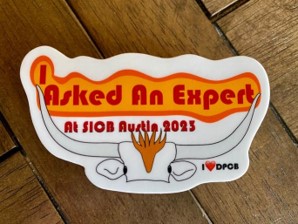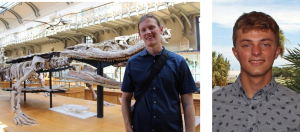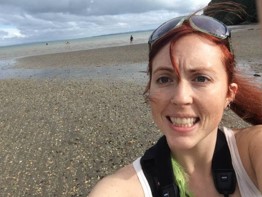Contents
Statement from DPCB Chair and Secretary
Samantha Price, Chair, chair.dpcb@sicb.org; Ryan Felice, Secretary, secretary.dpcb@sicb.org
Thanks to everyone who joined us at SICB 2023 in Austin and online as part of SICB+! This was a big year for DPCB. We hosted an exciting special contributed talk session in addition to our regular Best Student Presentation competition. We are happy to welcome our new DPCB Program Officer-Elect, Dr. Molly Womack from Utah State University. We think this year is going to be even bigger and better! We have an election this spring in which we will be choosing our new Chair-Elect. At the end of this newsletter you will find statements from each of the candidates. But first, let’s take a look back at the 2023 meeting.
Ask-an-Expert Booth

As always, the Ask-an-Expert booth was a big hit. Over 40 people visited this year to get advice from our panel of experts. We covered a huge range of topics, from imaging to morphometrics to systematics. We are always looking for new experts; reach out divisional secretary Ryan Felice if you are interested in contributing next year.
Special Sessions and Awards
The special session in honor of David Wake called “What amphibians have taught us about organism-focused evolutionary biology” was an incredible set of talks and a fitting tribute to Dave. We plan to run similar sessions at future meetings highlighting specific clades. Next up: Fish!

David and Marvalee Wake Best Student Presentation session was a great line-up of fascinating talks and posters. Our winners this year were Keiffer Williams for best talk with “Resolving a dental dilemma: quantifying tooth variation along the jaws in polyphyodont vertebrates” and Mason Thurman for best poster with “Biofluorescence as a Tool to Resolve Morphological Crypsis in Two Bonefish Species.”
Minutes from 2023 Members Meeting
If you missed our meeting in Austin, please check out the minutes from our Members Meeting, on our divisional website.
Message from the Program Officer
Leigha Lynch, DPO.DPCB@sicb.org
This year many amazing symposia were submitted for review for the 2024 SICB Annual Conference, and DPCB had the privilege to provide financial support to several. These include:
- Computational and Physical Models in Research and Teaching to Explore form-function Relationships
- Feel the flow: how water movement shapes organisms and ecosystems
- Convergent evolution across levels of biological organization, organisms, and time
- Immunity in the ‘omics age: what can ‘omics approaches tell us about immunity in natural systems?
- Rise of the Anthropocene: Understanding how Urban Ecosystems Drive Evolutionary Change
In August 2023, we will be seeking symposia contributions for the 2025 SICB Annual Conference and I encourage DPCB members to apply! Some possible topics include:
- The latest phylogenetic comparative methods
- New methods for calculating evolutionary rates
- Bioinformatics: best practices and applications
- Phylogenetic methods for modeling evolutionary and ecological processes
- The generation of biological novelty
I’m very excited for my last year as DPCB PO and look forward to seeing how the division and society will continue to grow.
DPCB Election Information
In the Spring SICB Elections, DPCB will be voting to elect our next Chair-Elect, and considering several amendments to our divisional bylaws, posted here. The ballot is now open – please vote!
Candidate Statements: DPCB Chair-Elect
Leigha M. Lynch

Current Position: Assistant Professor, Midwestern University, Glendale
Education: BS (2009) Bowling Green State University; MS (2012) East Tennessee State University; Ph.D. (2018) Oklahoma State University Center for Health Sciences; Postdoctoral Research Associate (2018-2020) Washington University School of Medicine
Research Interests: I seek to understand how variation in phenotype evolves as a response to environmental, dietary, behavioral, and genetic factors. My work focuses on the intraspecific variability of the skull, limbs, and brain and uses carnivorans as a model clade. My work is unique in that I acquire genomic data from the same individuals whose phenotype I’m quantifying, which allows me to make direct comparisons of phenotype and genotype in non-lab animals. By working with museum specimens, I can also capture how these interactions have changed through time. I use a combination of methods in my work including genetics, phylogenetics, phylogenetic comparative methods, 3D model rendering, geometric morphometrics, and GIS. This allows me to make inferences about how complex phenotypes arise as a result of the interaction between these various extrinsic and intrinsic factors.
SICB Activities: I have had the privilege to serve as DPCB Program Officer (2021-Present) and during my tenure saw how the society rose to the many challenges presented by holding a virtual meeting and then used these new tools to expand the accessibility of our science through SICB+. I have also aided in organizing the DPCB Ask an Expert Booth and have served as an Expert since its founding. I also strive to support SICB students and have thus served as a Wake Award Judge and a mentor in the Broadening Participation Committee Mentorship Program.
Statement of Goals: As Chair of the Division of Phylogenetics and Comparative Biology, I seek to continue the amazing work that has been established during my time as Program Officer, by expanding the Ask an Expert Booth to reach a wider audience both at the SICB conference and throughout the year. I look forward to working with current officers to develop more special sessions highlighting early career researchers within our division and symposia that demonstrate how the research questions and methods used by our division members can be used to synthesize research across all SICB divisions.
Daniel S. Moen

Current Position: Associate Professor, Dept. Integrative Biology, Oklahoma State University
Education: Ph.D., 2012, Stony Brook University; B.A., 2003, North Dakota State University
Research Interests: In my lab we study evolutionary biomechanics: the mechanisms and evolution of morphological and functional diversity. We primarily study frogs, addressing questions at or above the species level by using phylogenetic comparative analyses. We work with phylogenetic, biogeographic, performance, morphological, and ecological data.
SICB Activities: I came to SICB relatively recently in my career as a scientist (starting in 2016), when mentors suggested my research fit many SICB divisions: comparative biology (DPCB), biomechanics (DCB), vertebrate functional morphology (DVM), and ecology and evolution (DEE). I have since contributed to DPCB’s website (2017), judged presentations for the Wake Award (2017, 2019, 2023), and participated in the Ask-an-Expert Booth on comparative biology (2019, 2023).
Statement of Goals: My primary goals as the DPCB Chair would be to increase participation SICB members of other divisions in our division, as well as increase international participation in both DPCB and SICB in general.
These goals come from a number of observations. First, SICB includes “comparative” in the title, yet DPCB continues to be one of the society’s smallest divisions. Second, the vast diversity of other divisions always have (to some extent) included phylogenetic comparative studies in their research and presentations. But for whatever reason, they have been slow to recognize that they could join, contribute to, and learn from DPCB. Third, while I have many international collaborators, very few know about (or attend) the SICB annual meetings. Thus, I think DPCB has potential to grow.
As Chair, I would work to achieve this growth in three ways. First, we could organize a phylogenetic comparative symposium showing all the cool research done across divisions, research that also would find a home in DPCB. Second, I would coordinate a one-day, pre-SICB workshop on phylogenetic comparative methods. It would be geared toward participants from many research backgrounds, to better integrate phylogenetic analysis into fields less comparative in nature. Finally, I know many members of the DPCB executive committee have worked hard to increase our presence in SICB. So I am excited by the prospect of working with others to implement their ideas for making our division a center of SICB.
